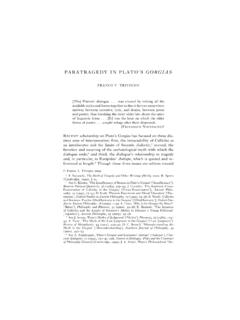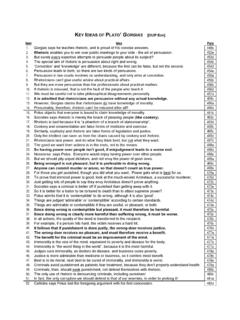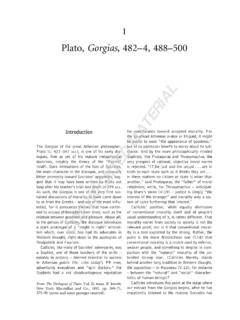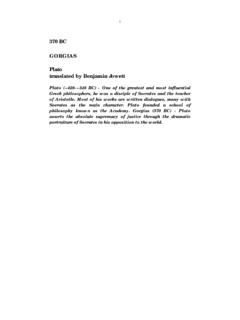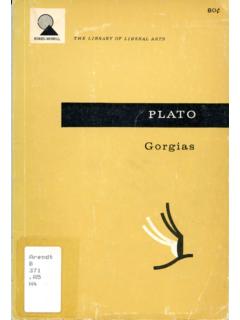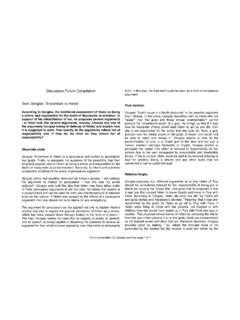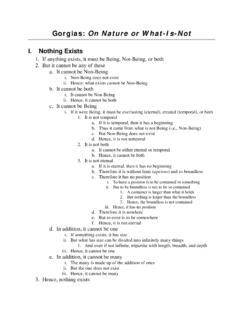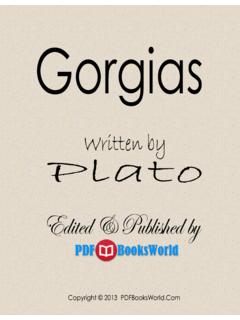Transcription of Gorgias on Thought and its Objects - U-M Anc Phil
1 R Chapter 16 Gorgias on Thought and its Objects * Victor Caston Und es ist kein Geschwiitz, wie man sunst wuhl glaubt; seine Dialektik is' objektiv. -Hegel, 1833, p. 37 Gorgias ' 011 Not Being is the Charybdis of Presocratic philosophy. If taken at face value, it undermines the foundations of philosophy and life itself, by arguing, first, that there isn't anything; second, that even if there were something, it could not be known; third, that even if something could be known, no one could inform anyone else of it. Yet there is at least one thing, a treatise, that contains demonstrations for various conclusions, written in order to inform us, thus undercutting all three claims.
2 How are we to construe a text charitably whose arguments are so obviously self-refuting in this way? This question alone makes it implausible to think that Gorgias endorses a particularly dark form of nihilism, the result (as some would have it) of philosophical despair and world weariness. 1 Gorgias would have to be not merely disconsolate, but quite dull-witted, to have missed the conflict between his presentation and its content. Similar considerations put in doubt any attempt to take Gorgias as a kind of The self -undermining character of * It is a special pleasure to dedicate this essay to Alex Moure\atos, who has been a model teacher, a caring mentor, and a true friend.
3 This piece is a very small return for all that I have gained and learned from him. I The classic statement of this position can be found in Diels, 1884, who argues that after a period of pursuing Empcdoc\ean physics, Gorgias entered a 'period of doubt, or rather despair,' during which Eleatic dialectic led him to reject natural science and write On Not Being; but unable to sustain this 'barren Nihilism,' in which 'the world of bcing had dissolved into empty appearance,' he turned to rhetoric, in an effort to turn 'appearance into reality in the beliefs of his audience' (pp. 371-3; cf. 368). This view occurs in other authors as weB: Grant, 1866, p.
4 95; Windc\band, 1888, p. 71 (though see n. 7 helow); SUss, 19\0, pp. 56-7; Huizinga, 1944, p. 245; Capelle, 1953, p. 24 (though see n. 14 below). A modified version of this position can be found in Praechter (in Uebcrweg, 1920), who argues that the 'nihilism' of the first part of On Not Being is a 'paradoxical extension and trumping of the scepticism' of the second and third parts, whose conclusions Gorgias is supposed to have endorsed as his own (pp. 134-6). Ncwiger, 1979, argues that the demonstrated conclusions of the treatise are nihilistic, but that the underlying conviction is not, reflecting instead a 'sound' common sense.
5 2 The clearest statement of this interpretation can he found in Calogero, 1932, pp. 205-7, 211, 215-17, 219-21; but see also Lattanzi, 1932, pp. 289-90; von Fritz, 1946, p. 32; Dupreel, 1948, pp. 64, 68, 74; Guthrie, 1962-81, pp. 272-3; Newiger, 1973, pp. 157-8 Ccf. 138-40); Newiger, 1979, p. 58; Mansfeld, 1985, pp. 104-6; Pepe (1985), esp. pp. 503-4; Zeppi (1985), passim; Mourelatos, 1987, p. 164 n. 2; Mansfeld, 1988, pp. 224, 226. Cassin approaches this view. insofar as she takes the treatise to argue for an 'inditference' between all propositions: none is any less 'true: and so not intrinsically preferable, than any other.
6 Beyond being of what appears to be the case at a given moment (1980, pp. 69, 91-4, 526-7). Zeller should perhaps also be grouped here, even though he describes Gorgias as a 'sceptic: since on Zeller's view 'scepticism' involves the denial of any ohjective truth, a position he claims Gorgias shares with Protagoras (see esp. 1919-23, vol. , p. 1368) -a view that goes back to Grote, who takes Gorgias [0 reject only the '1lItra- existence' of things (1849-56, pp. 503-4), and to Grant (1866, pp. 205 206 Presocratic Philosophy the text implies that it could serve, at best, only as an indirect argument for relativism, with Gorgias playing Zeno, as it were, to Protagoras' Parmenides, But it would have to be very indirect, as a simple reductio ad absurdum is out of the question.)]
7 There is a considerable gap between a relativist position and the mere negation of Gorgias ' For the same reason, On Not Being could not establish any of the other positive positions that have been ascribed to it, whether it be radical empiricism,4 'tragic' existentialism,s or some form of It might be tempting, then, not to take the treatise seriously at all, but rather as a kind of elaborate joke or spoofl - tempting, at any rate, until about the fourth or fifth 97-8), who adopts a more moderate, 'Kantian' form of this position. This emphasis on an exclusively 'phenomenal' focus easily lends itself to subjectivist and idealist intcrpretations: see n.
8 31 below. One difficulty with this line of interpretation is that it generally operates with an imprecise, and sometimes confused, conception of relativism. (For a salutary corrective to this tendency, sec the excellent and thorough examination in Bctt, 1989.) But the greater stumbling block by far is that Protagoras rejects the possibility of error, which puts him into direct conflict with Gorgias -something already noticed by Levi, 1941, pp. 184-5 (= Levi, 1966, p. 232), and exploited by Di Benedetto, 1955. See below pp. 216-17. 3 Just such an indirect argument is attempted by Mansfeld -see n. 41 below. 4 Newiger, for example, compares Gorgias ' position in Part III with Locke's affirmation that 'nihil est in intellectu quod nonfnerit in sensu' (1973, pp.)
9 175-6,180; 1979, pp. 58-9): even in Part IT, where the possibility of knowledge is denied, Gorgias is supposed to have given sense experience paramount importance, resting his entire argument on the authority of its claims (1973, pp. 137 -40; 1979, pp. 56-8). Similarly, Loenen, 1959, pp. 193, 195, 201, 203. Montano, 1985, argues that Gorgias ' treatise is aimed at showing the bankruptcy of reason divorced from immediate sense experience, which is supposed to provide the ultimate standard. S Untersteiner, 1967, vol. 1, pp. 151-318. 6 This seems to be the thrust of Graeser, 1983, p. 41. Rosenmeyer may he thinking along similar lines, when he claims that for Gorgias speech 'docs not distort reality, for it has no measurahle relationship to it' (1955, pp.
10 231-2: emphasis mine). 7 The most influential statement of this position can be found in H. Gomperz, 1912: 'there is only one thing one must not do .. one must not take the subject matler of these 7raiyvta "seriously'" (p. 28), and again, ' Gorgias ' "philosophical nihilism" should he struck from the history of philosophy. His humorous speech on nature has its place in the history of rhetoric' (p. 35; Segal . 1962, p. 100, mistakenly characterizes this quotation as endorsing the view that Gorgias was a philosophical nihilist). But essentially the same position occurs earlier as well: Windelband considers On Not Being a 'grotesque farce' not to be taken seriously at all (1892, p.
